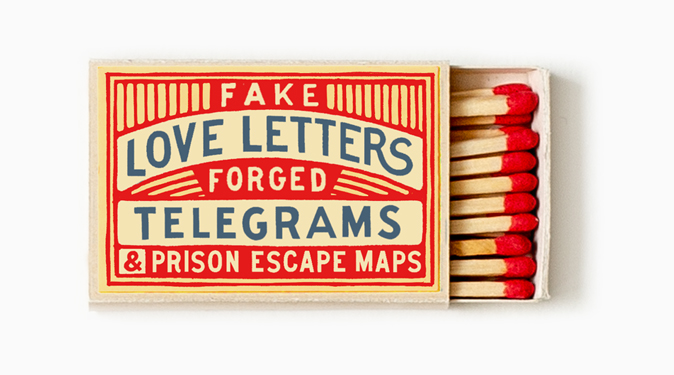Graphic Design for FilmMAKING
PROP DESIGN WORKSHOP
How do you start designing a collection of graphic props that can tell a director’s story, as well as contributing to the genre, period, and visual aesthetic of a film?
Photograph by Kalie Reid
What will the workshop cover?
Understanding your role: how a film graphic designer works for the production designer, set decorator, art directors, prop master, and (occasionally) the director.
Research: how to find great artefacts to use as inspiration, and how to pick apart the design methods that created them in order to imitate them effectively.
Storytelling: how to elevate your graphic props so that they move from being simply ‘realistic’ to something more like ‘authentic’ – illustrating a character’s journey and helping to tell the director’s story.
Typesetting, lettering, and hand-writing: when to use fonts, when to draw by hand, and how to cheat at all this when time is against you on a film set.
Resources: archives, museums, font suggestions, and links to various other helpful resources.
Practical exercises: forge an authentic 1950s passport using simple graphic tools like embossing dies, rubber stamps, needles and thread, and good old pen and paper.
Presentation: how to photograph and present your work to show it off at its very best
Connecting: how to contact people in art departments to look for work.
Confidence
As well as the list above, I also like to send everyone home with two key takeaways: firstly, confidence. Who knows if your first film job is going to be set in Victorian London or on a spaceship flying 500 years in the future? Film work is always about being thrown in at the deep end: the trick is feeling confident enough to try your hand at new things. And, secondly, how to cheat. Working in film means I’m not really an expert in any one area of design, I’m just a little bit good at lots of different things. You don’t necessarily need to be an expert hand-letterer or calligrapher to draw graphics for film; you just need a sleight of hand.
Where will the workshop take place?
We’ll be in the Joyce Room of the old Woollen Mill restaurant, which looks out to the Ha’Penny Bridge on Dublin’s river Liffey.
Will we actually be making our portfolio during the workshop?
No! We’ll make a couple of physical prop-makes, but it’s going to take you weeks to work on your own prop designs. We’ll set up a WhatsApp group where you can share your progress with the group in the weeks (or months!) afterwards and you can ask me any questions by email if you get stuck. I find that the most successful groups are the ones who form a little community, and some of the work my students have gone on to make is absolutely beautiful.
How many spaces do you have on each workshop?
I’ll be keeping this group size small and limiting it to 8 people, so that we have time to listen properly to all your portfolio ideas.
The old Woollen Mill, overlooking the Hapenny Bridge
What should I do to prepare for the workshop? Do I need certain qualifications? Should I bring something with me?
All attendees should have some kind of a background in graphic design or illustration. You will need a notebook and pen with you, and some kind of device to look up and save images online – iPad, laptop, or smartphone etc. When you book your place I’ll send out an email with some suggested reading and viewing material before we get started.
How much is the workshop and what is covered?
The workshop is €800 per person, paid in two instalments. This covers the two days of tuition, access to the subsequent WhatsApp support group, and feedback on your portfolio pieces as and when you make them. It also includes lunch both days – we will all eat together in the restaurant beneath the studio.
Will I get a certificate?
Yes, but the catch is you have to make it yourself :)
This course is for you if...
You’re a graphic designer or illustrator looking to translate your skills to filmmaking or enhance the work you already do.
You're a design student or graduate considering a career in film.
You’re a film graphic designer who wants to make the move from contemporary realism to period, fantasy, animation, or genre filmmaking.
When is the next workshop?
All dates for 2025 are sold out, but I have three workshops in the new year open for booking now, in January, February, and March 2026:
How can I hear about new workshop dates?
Sign up for my newsletter or follow me on Instagram. Or, if you’re really keen to secure a place, you can drop me a message on my contact page and I’ll add your name to the waiting list. The workshops tend to sell out quite quickly as I really like to keep the groups quite small, I’m sorry!


